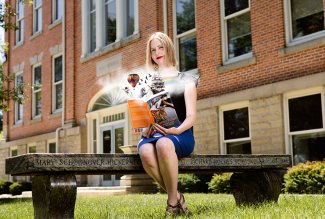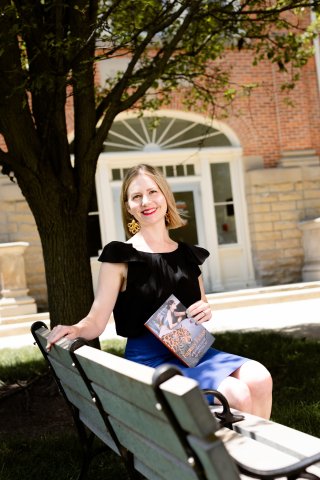
In the world of higher education, is there a place for magical worlds?
Ohio Northern University’s Jennifer Pullen, Ph.D., thinks so.
The associate professor of creative writing recently authored the only collegiate-level textbook on fantasy fiction writing. Published this spring by Bloomsbury Publishing, “Fantasy Fiction: A Writer’s Guide and Anthology,” seeks to expand the academy’s literary canon to include an often overlooked—yet culturally-relevant—genre.
“There is a long history of fantasy and science fiction essentially being sort of ghettoized, and not treated as real literature with a capital ‘L,’” explained Pullen. “Tolkien and C.S. Lewis got let into the canon, but no one else.”
Pullen is committed to evangelizing the literary value of fantasy fiction. If she has her way, the discipline would be more widely taught at colleges and universities. It’s a lofty goal that’s personal, she explained.
“I essentially wrote the textbook I wish had existed when I was an English student.”
Her foray into fantasy fiction started with Grimms’ fairy tales as a small child. She was then enthralled with the 1982 animated film “The Last Unicorn,” watching it so many times she wore out the VHS tape. In her pre-teens, she read the book based on the film, by author Peter Beagle, and wept at the end.
“I’ve spent the rest of my readerhood chasing that feeling of a story that is filled with sadness and wonder at the same time,” she said.
What differentiates fantasy fiction from other genres is “impossibility,” according to Pullen. Stories unfold in make-believe worlds where impossible things happen—magic, dragons, wizards, whatever creatures the imagination can conjure—but those things are naturalized to that world.
The genre is experiencing a “Zeitgeist in the last 15 years or so,” she explained, due to the popularity of “Lord of the Rings,” “Harry Potter,” “Game of Thrones,” and others.
In troubling times, people crave an escape from harsh reality. Fantasy fiction also provides a safe space to process overwhelming human emotions—like grief, longing, fear—because the characters and the world aren’t “real.”
“Fantasy has its roots in Romanticism in its search for extreme emotions—that which is awesome and awful. It takes real human problems and magnifies them in ways that lets you see them anew,” Pullen added.
Her childhood fascination with fantasy fiction led her to pursue a bachelor’s degree, MFA, and Ph.D. in English. In the course of her studies, she realized that her beloved genre had no home in the academy. For her Ph.D. dissertation, she researched why, uncovering a confluence of political and cultural reasons dating back to the 1940s that have managed to persist despite changing times.
Pullen came to ONU because the University offered the rare opportunity to teach fantasy fiction to budding authors, as well as any student who wants to develop skills in imagination, writing, history, and empathy, inherent to the process of writing fantasy fiction.
As Pullen’s reputation as a fantasy fiction expert grew nationally, Bloomsbury Publishing approached her with the invitation to write the first collegiate textbook on the subject.
“Here was an opportunity to talk about something I’d spent my whole life talking about and thinking about,” she said. “This book enabled me to sort of get on my soapbox and explain the value of fantasy and why we should include it within our understanding of the canon of literature, and why it should be appreciated.”
After three years of research, writing, and editing, Pullen is delighted with the positive reception “Fantasy Fiction: A Writer’s Guide and Anthology” is receiving from English colleagues across the country.
The book provides history and background on the genre along with writing strategies, such as prose style, how to world build, and how to do character development. Additionally, it includes an anthology of stories that she chose by contemporary writers.
Pullen hopes her textbook opens a magical door of possibility for aspiring fantasy fiction writers and teachers.
“I want there to be fewer students who come into the creative writing classroom interested in fantasy fiction and their teacher doesn’t feel equipped to teach them,” she said. “Hopefully, this book makes those aspiring writers feel legitimized.”
